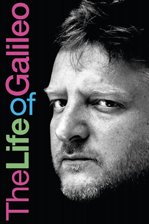
It was just one of those days when Oxford felt very far away from London. Almost everyone is resigned to using the services of The Oxford Tube, a coach service that runs 'every 10 minutes' ('at peak times'; sub-caption in microscopic font). The train service is for gamblers: you might get there in half an hour if you're lucky; if you aren't, you might find yourself being shunted to and fro endlessly in a Sartrean hell somewhere between Reading and Didcot Parkway. The Oxford Tube takes longer, but at least even if it's slow, it's predictably slow. Besides, it's less than half the price.
This was one of the days when slow was excruciating: at every stop before leaving Oxford there were fifteen people waiting to get on, all of them with luggage and wanting to pay with fifty pound notes. At a certain point, or, to be more precise, when the clock hit seven o' clock and we had just reached Hillingdon, I gave up on the idea that I would catch the play at all. We pulled in at the Marble Arch stop at twenty past, and I hopped into a taxi. As we passed Big Ben its hands read exactly 7.30. London taxi drivers know where everything is, or are supposed to, so you know they're lost when they say something like 'Um, er, the National is the theatre that's, er...' 'Directly in front of you with a sign projected onto its facade.'
The play that I was impossibly trying to catch was The Life of Galileo, a play about which I knew nothing and had no expectations whatsoever. It was also part of the £10 sponsored season at the National, which was why I was fairly sanguine. If I missed the play completely, a stroll on the South Bank was an acceptable substitute; and I have, after all, lost more than £10 on poorly-judged purchases at a music store. But oh, what a waste it would have been if I had turned around and not walked the few extra steps to where an unexpectedly nice usher took pity on me and said he would sneak me in during a scene change in about three or four minutes. In all I missed about twelve minutes of a play that ran for three hours and ten minutes. And I'm actually considering going back to see all 190 minutes of it all over again, because every second of it was absolutely brilliant.
The costumes and sets were a melange of anachronisms, but the effect of this was to draw attention away from them, rather than toward: a kind of anti-operatic effect, to remove all sense of pageantry and period and focus attention on the text. Galileo's daughter, in flats and capris, could have strolled in off Oxford Street; on the revolve (the play is on the vast, well-equipped Olivier stage) she literally runs up against the cardinals in their medieval red and black. And in the middle of all this is Galileo himself, in a rumpled white linen shirt; he is not straddling these two worlds: he is what at the same time holds them together and yet, because he cannot help but do so, divides them by his words, ideas, and, not incidentally, his character. There are wonderful reviews of the play out there that I will not try to outdo, but I have to say that the two things the average educated person knows about Galileo were delivered brilliantly: the recantation, delivered offstage, with a time-shifted Simon Russell Beale sitting facing the audience, the map of the world on his face; and the coda 'e pur si muove' delivered in the final moments of the play visually, the very familiarity of the image delivering unto us, the audience, the universe as we know it.
It's a phrase that I have come to mutter, more in desperate hope than anything else, when the Oxford Tube is jammed on the ring road heading westward out of London.

